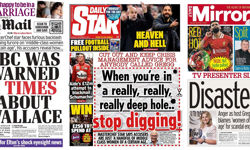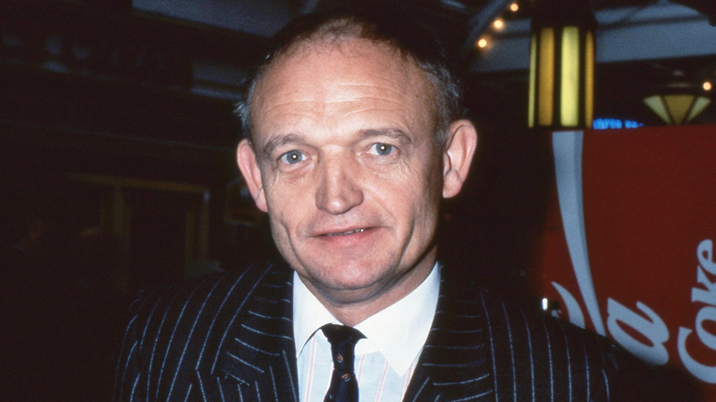
The letter ‘z’
I used to love it when the executive editor ran the show on a Sunday. I was a lowly copytaster and occasional chief sub, but he had time for me and on some of those Sundays we would cross Grays Inn Road for a G&T in the Blue Lion. The chat was exclusively shop.
In those days – 1982 or 3, I guess – Times style was “ize” where most of the rest of the world’s was and is “ise”. We had quite a few such quirks. Gorbachov, not Gorbachev was another (though he came to power a bit later); Russians whom most would call “Alexander” were rendered Aleksandr; the plant that grows up houses was wistaria. It all came down to going to the root of the word – for example, the climber was named in honour of an American doctor called Caspar Wistar. All of these deviations from the mainstream have since been ditched.
But back to the Blue Lion and a Sunday night conversation about these oddities. “In the unlikely event that I were ever to become editor of The Times, I would eschew the z,” my companion said. “I would excise the ize.”
And so he did. Charlie Wilson was very soon promoted to deputy editor and subsequently to editor; the z duly vanished.
“Eschew” is one of those words that crops up in crossword clues, but rarely in general conversation (“thwart” is another, although that enjoyed a burst of popularity after the referendum). So whenever I see the word, it puts me in mind of that supper break 40-odd years ago. As it did last week as I caught up on the previous Saturday’s jumbo crossword and came across the clue “Avoided middle in test ground (8)”. (To parse the answer for non-cruciverbalists: “middle in test” = es; “ground” = chewed; whole clue: “avoided” = eschewed.)
Ah, Charlie! He’d been in my mind anyway; that crossword came slap bang between our birthdays – his on the 18th, mine the 22nd – and I have never failed to think about him on “his” day. (There are others – the chap who sat next to me “dongling” the pages; my predecessor as business night editor; the Telegraph columnist Allison Pearson are among those whose birthdays are seared into my brain and come unbidden to mind every year.)
But then, of course, Charlie was wrenched from gentle swirling-round-the-head musing to full-frontal lobe domination, courtesy of an email from another former colleague. You can’t be shocked by the death of a man at 87. Grief is probably too strong a feeling for someone you’ve seen barely half a dozen times in the past decade (Always with the same opening line: “Why, hello! Have you lost weight?” Patently not!). But sadness, yes.
Dave Clarke

A sadness upon sadness, actually. As another former colleague had died after a two-year illness the previous week. I hadn’t seen Dave Clarke – Nobby to his close friends and wife, the former News of the World editor Patsy Chapman – for nearly 50 years, but word of his death knocked me for six. We had been reporters on the Evening Gazette in Colchester (along with the Mail’s Richard Kay and the Telegraph’s William Langley) and Dave was half of an imposing double act with Paul Davidson. Both sturdily built six-footers, walking side by side in their raincoats, they were frequently taken for policemen – a sometimes useful misconception that they were disinclined to correct.
They were a formidable team, working on big stories that made national news, and both went on to Fleet Street – and thence Wapping. There, first Dave, then Paul, who had been badly injured reporting on the Brixton riots of 1985, moved to the dark (or golden, depending on your perspective) side of journalism as sub-editors, guarding the language, guiding the youngsters. Paul died of a heart attack on the train home from a Sun shift seven years ago. He was 65. Dave, who had been chief sub and night editor at the News of the World (apart from when Patsy was in charge), was 73.
The changing nature of journalism

As I write this, an email pops up from former Sunday Mirror editor Paul Connew with a reminder that the memorial service for another (literally) big beast of journalism is being held at St Bride’s at 11.30 today.
I first met David Banks (yes, he does look just like Paul and Nobby!) in 1985 in Chicago, where I had been sent by Charlie to learn the Atex computer system. Charlie had been named editor of Murdoch’s putative London Post and my Times colleagues fully expected me to join his team. I was rather hoping to be night editor. I spent three months on the Chicago Sun-Times, which Charlie had previously edited, and towards the end of my stint I was joined by Dave Banks and Tony Norbury, the Times production supremo. Banksy was night editor of the Sun and he, too, was expecting to take on that role for the Post. I was not so deluded as not to realise he had the greater claim.

None of us knew at that stage that there would be no Post and that we had been sent to learn the tech to put it into practice on our existing papers. Come that momentous first night at Wapping, Banksy led the subbing team that produced the Sun, while across the internal road, I did the same job on The Times.
Banksy went on to edit the Mirror and when he left Fleet Street, he became a champion of hyperlocal news, setting up the Voice of the North site in Northumberland, and getting back to basics covering magistrates courts and parish councils.
There is a point to this amble down memory lane in a week when I might have been expected to focus on the departure of one prime minister and the arrival of another. It’s about the nature of journalism.
I’m not at all misty-eyed about the methods sometimes employed by my friends and their employers over the course of their careers. Charlie may have briefly been editor of the Times, but all four were tabloid journos to their core. They all knew what people wanted to read and were maybe not too precious about the tactics needed to get some of those stories. But they all also had the same conviction about what newspapers were about – and that was news, not comment. And they further all believed that they should tell the whole story, not just part of it; that facts, not opinion, were what mattered.
Yes, a piece might be written in such a way as to encourage sympathy for one side over the other, to provoke disapproval of heavy-handed or incompetent officialdom, but the stories they handled were genuine stories, not manufactured to further an agenda. And the reader was allowed to draw his or her own conclusions about the rights or wrongs of the argument, not instructed what to think.
Today’s newspapers offer readers a limited menu, banging on about their pet subjects day in, day out, week in, week out. They all do it – the Guardian, the i, and The Times, are just as guilty as the white and red tops. Metro and the Star are the only ones that seem willing to deviate from the path of conformity.
This week they can, of course, be excused. A new prime minister can hardly not be top of the newslist. But it’s not just the restricted diet of what our papers prioritise that is the problem, it is how they serve it up. We aren’t offered roast, grilled, fried, poached or steamed chicken with chips, mash, Lyonnaise, dauphinoise and croquette potatoes with a variety of fresh vegetables. We get chilli-hot chicken with firecracker spuds every time. And instructions on how to wield our cutlery as we try to digest it.
Entrenched positions
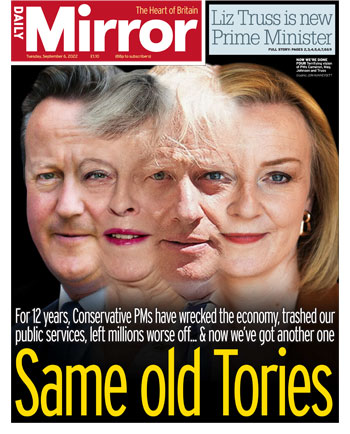
The Mirror naturally thinks the Tories are a complete shower and every front page is what a disaster they have been and will be. The Mail and Express are the reverse, burnishing the Johnson years as some kind of golden era, pretending that the various problems the country is facing – and even they have to admit that there are a lot – are nothing to do with the government. They simultaneously welcome Liz Truss as being the answer to the nation’s prayers, the woman who will bring a whole new approach, while also noting her experience – in the administrations that have brought us to where we are – and her loyalty to the man she is replacing. Is she a breath of fresh air or the continuity candidate? Is it a good thing to be as resolute as they say she is or should we be pleased that she has the flexibility to change her mind – as a “reformed” Remain-voting republican LibDem?
The question I would like to see answered is why on earth she – or anyone – would want this job at this time. Naked ambition? Delusion (because absolutely no one could hope to sort out the multiple headaches in the time available before the next election)? Public duty? The profiles are all skin-deep.
We keep seeing the same soundbites (to be fair, she has spent six weeks saying the same thing over and over), but nothing in all the acres of newsprint leaves us much the wiser. Instead we are told that everything is going to be just fine. It makes me angry.
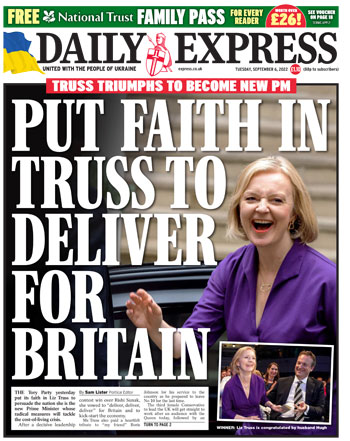
I’m perpetually angry these days. But Tuesday’s Express splash took the biscuit: “Put faith in Truss to deliver for Britain”. How dare it! The intro says that the Tory party has put its faith in her. But that’s not at all the same thing as our being told what to think and do. The Tories can put their faith in her; the Express can put its faith in her (as it did with Cameron, May and Johnson and would have done with Gove or Sunak), but it is not the place of any newspaper to tell its readers at this stage of the electoral cycle that they should do the same.
None of us has any choice but to hope that Truss is able to do a half-decent job. We should, perhaps, wish her a following wind and the best of luck. But she is in No 10 courtesy of the votes of just over 82,000 people in a country of 67 million. She was not even the first choice of her party’s MPs. The woman who has stated that unions and Scots who want ballots on strikes or independence should secure the approval of 50% of their electorate to prevail managed only 48% of hers. She has no democratic mandate and, while right-leaning papers can be expected to give her all their support, it is outrageous for them to suggest that she is “clearly the woman for the job”.
Historic? How?
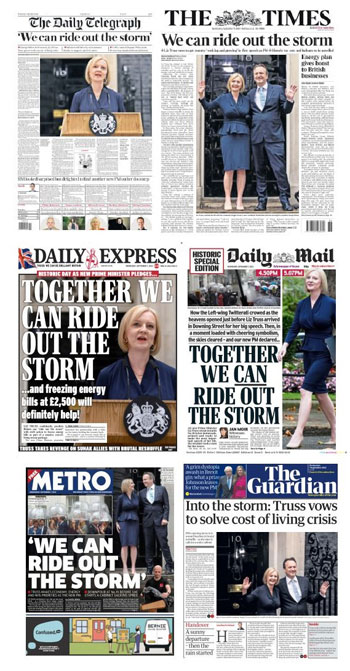
Yesterday’s papers naturally focused on her arrival speech, with five going for the “We can ride out the storm” headline and the Guardian doing a play on it with her going “into the storm”, while the FT took the more conventional “vow to steer Britain out of energy storm” approach. I’m not quite sure why the Mail had to underscore the “can”. It just had to.
Just as it had to have a bash at “the leftie Twitterati” on a day when it could have concentrated on its star taking office and what she had to offer, rather than sniping at people tapping on their keyboards at home. The whole thing was ridiculously over the top, with a cloudburst clearing just in time for her to stride into Downing Street “in a burst of sunshine”. “Historic special edition” proclaimed a little box top left of the front. Historic? How? We’ve had three new prime ministers in six years; we’ve had three women in No 10; she’s the second successive blond(e). (Gosh, I get so cross when people write that Boris is “blonde”. Must go to anger management classes.)
As far as I can discern, the only thing remotely historic about this particular change of leadership is that for the first time – if only for a few hours – we had a head of state and head of government who shared the same forename.
Who’s offended now?
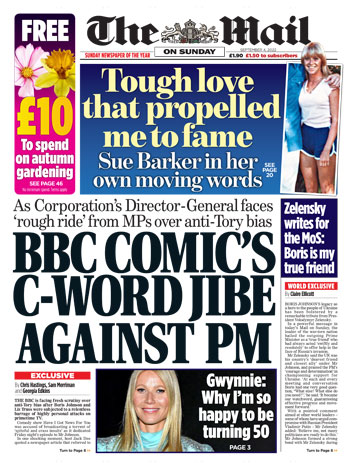
But the Mail has gone full-on bonkers this week. Starting with the Mail on Sunday’s “exclusive” splash, which was based on somebody watching the Have I Got News For You “Boris tribute” and finding some people to moan about it.
“BBC comic’s C-word jibe at PM” it cried, under a strapline about MPs preparing to give the director-general a rough ride over “anti-Tory bias”. Making fun of a departing prime minister was, of course, a blatant example of just that. Never mind that said PM had voluntarily appeared on the show several times – knowing full well that he would be ribbed mercilessly – to help build his public persona. The programme was also “sexist” because it had a pop at Truss and Nadine Dorries.
This is the anti-woke paper that asserts people have no right not to be offended. That free speech is sacrosanct. That people should realise when non-pc remarks are intended as jokes. This is the paper that believes making derogatory comments about refugees / immigrants / asylum seekers is absolutely not racist. The paper that pooh-poohs women who complain of sexism in the workplace.
Yet, suddenly, to poke fun at Truss and Dorries was automatically sexist. Even when the jibes were about their behaviour and attitudes and had nothing to do with their gender.
But the “most offensive” part of the programme, according to the text, was for compere Jack Dee to quote a national newspaper quote from a member of the Cabinet, albeit obviously an anonymous one.
It was not, apparently, offensive for the minister to make the remark or for the Times to report it.
No. The “sin” was all Dee’s and hence became a stick with which to beat the BBC.
So, in a spirit of friendship, I decided to help the MoS with its splash headline-writing to make it more accurate:
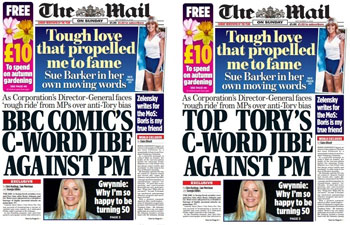
Comedian mocks politician
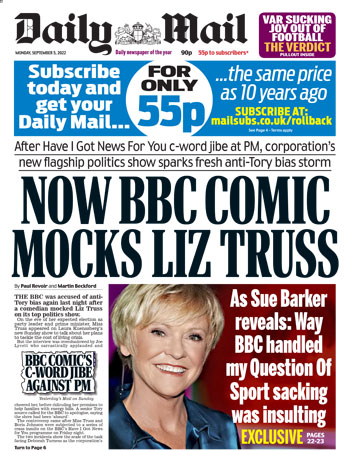
The Beeb doesn’t help itself, though, does it? Who really thought it a good idea to invite a comedian – any comedian of any political outlook – on to Laura Kuenssberg’s inaugural Sunday show? Joe Lycett went down a storm with those with no time for the Tories or, at least, this government. And he predictably got the backs up of everyone who does support the Conservatives and doesn’t like the BBC.
This is supposed to be the flagship political programme, launching in the very week we have a new prime minister. If ever there were a time for a serious debate to lay the foundation stone for the new format, this was it. Kuenssberg may want her show to be fun, but perhaps the comic turns in the guest chair could have waited a few weeks until she had settled into her own seat.
Left-leaning people accuse the corporation of self-censorship; this was an occasion not for self-censorship but for self-restraint. There are plenty of occasions for satire, but this wasn’t it – there are other effective ways to challenge Truss’s assertions.
So, as night follows day, the Mail was back on Monday with “Now BBC comic mocks Liz Truss” (coupled with Sue Barker being insulted by the way she was sacked from A Question of Sport). Did no one read that headline and think, “Yes, but comics always mock politicians”?
It’s what they do.
As I say, this is the paper that – in another life – believes that no area should be off-limits for anyone. It’s free speech, innit? Hence this headline from the Mail Online in June: “‘The job of comedy is to offend!’ Rowan Atkinson says comedians should be allowed to make jokes about ‘absolutely ANYTHING’ as he rails against cancel culture”. (Thanks to Professor Russ Jackson of Sheffield Hallam uni for spotting that one.)
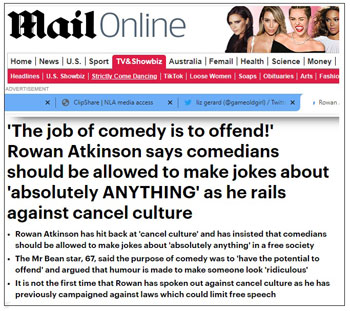
See what I mean about papers banging on about their pet subjects. Does anyone outside of Kensington – and probably even the executive suite in Derry Street – really think Joe Lycett taking the mickey was the most important / interesting / instructive / relevant story of last Monday? It seems to me the only beneficiary of this little temper tantrum will have been Lycett himself, in the shape of more ticket sales. It is to be hoped that Liz Truss, with her much-reported “steely resolve”, will easily cope with such treatment. For there’s bound to be a lot more of that coming her way. Conservative, Labour, LibDem or SNP, it doesn’t matter: It goes with the job.
Boris Johnson’s legacy
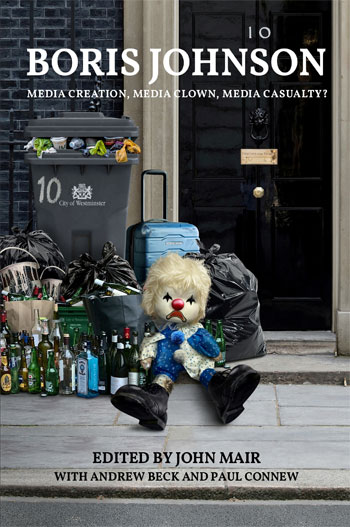
Going back to my late departed friends and colleagues, the point I’m labouring to make is that real journalists don’t buy into this kind of “journalism”. Scrolling through my laptop this week has seen a succession of email and social media feeds paying tribute to Charlie and Dave. The phrases that crop up most often are “they don’t make them like that any more” and “we’ll never see his like again”. We will certainly never see a messenger-to-editor story such as Charlie’s again. But why shouldn’t we see their “like” again? Why don’t they “make them like that any more”? People expressing these sentiments included some still toiling at the coalface. Have they given up on straight, honest, news-based journalism? Are they admitting helplessness in the face of corporate and political agendas? What a sorry state of affairs.
It may be coincidence that these sad deaths and the subsequent outpourings came at the same time as Boris Johnson’s downfall, but it’s no coincidence that that downfall has brought about fresh consideration of the state of the media and their relationship with our politicians.
John Mair, who has edited some 50 “hackademic” books intended, as the name suggests, to take an academic look at journalism, has put together a collection of essays about the media’s role in creating, sustaining and bringing down Boris Johnson. Rather like Emily Maitlis’s example of how, in the name of balance, the BBC would search for days to find someone to argue the counter-case against a widely-held opinion, Mair appears to have struggled to find fans to defend Johnson’s record. Of 26 chapters from distinguished writers such as Connew, John Curtice, Gina Miller, Peter York and Raymond Snoddy (plus one from yours truly), only two find much good to say about his time in office. One is by the Telegraph’s Robin Aitken. The other is by the man himself, in the form of a polemic pushed out three times, first in a speech, then in a press release, and finally as a signed article for the Sunday Express. This obviously majored on a list of “achievements” that have been trumpeted by supportive papers and derided by those antagonistic toward him.
Johnson’s role as a brick-builder for Brexit, with his bendy banana despatches from Brussels back in the 80s, has been well rehearsed and crops up here again. But Tim Walker, a former Telegraph colleague of Johnson and now diarist for The New European, alights on a new and interesting perspective on his influence on our trade. Walker says that the newspaper industry has changed beyond recognition over the past 30 years – and for the worse. “Cynicism as well as idealism has always been there,” he writes. “But Johnson more or less single-handedly drained it of the latter. He blurred the distinction between news and comment, the journalists who report on politicians and the politicians, and, all of a sudden, individuals who genuinely entered into the trade to do good are finding themselves actively engaged in doing bad. They’ve lost sight of the best interests of their readers – standing up for the little guy against the big guy – and concern themselves only, as Johnson used to, with the best interests of their non-dom owners.”
A sorry indictment, but there’s more: “I remember my first sight of Johnson at an editorial conference…he was very obviously in the business of confirming prejudices rather than challenging them: he’d make lazy clichéd remarks about foreigners, minority groups, the working classes, Liverpudlians, and women he claimed to have bedded. He was the Barclays’ [Fred and David, the Telegraph’s owners, not the bank!] man through and through.”
And he concludes: “It’d be nice to think there’d be a flight to quality journalism in the years ahead, but Johnson has done to the trade what he’s done to politics, and now most people will conclude that we are all as bad as each other.”
This is a shameless puff, but the whole book is a good read. It’s called ‘Boris Johnson, Media Creation, Media Clown, Media Casualty?’ You can find it on Amazon.
Hack tips

It’s not just political agendas that are doing for the sort of journalism that Wilson, Clarke, Davidson and Banksy grew up with and championed. There is a dumbing down hastened more by the internet than anything Rupert Murdoch might have cooked up in the early days of his Sun ownership.
The “news” feed on my phone offers an endless supply of online stories about Endeavour and Masterchef rather than anything of significance, such as the Pakistan floods. The other day it threw up a story from the Mirror (all of this is online, rather than in print), headlined “Woman shares 27p kitchen staple that works to kill maggots lurking in your bins”.
I appreciate that this is too much information, but this happened to be a problem I had encountered that day. So I clicked. And what I found was exactly the sort of thing you find if you’re foolish enough to fall for “You won’t believe what….” or those recipe blogs that give you page upon page of how everyone loves this dish before telling you how to make it.
“We’ve all been there – you go to put something in your wheelie bin and find flies swarming around it, usually accompanied by maggots wriggling round inside the bin itself...” began the double-bylined piece. “It’s a skin-crawling experience, but one that almost all of us have had to deal with at some point.
“And while your first instinct might be to move house or set your bin on fire [really?], there’s – thankfully – a much cheaper and less dramatic way of dealing with the bothersome bugs, express.co.uk reports. One woman has discovered that a simple kitchen staple that you probably already have in your cupboards can rid your bin of maggots and flies – and if you don’t have any at home, it’s dead cheap to buy…”
We now have a picture of a wall with some wheelie bins lined up against it (having earlier been treated to a single bin with a black bag bulging out of the top) before we learn that our “one woman” is someone who had replied to a question on the Mrs Hinch cleaning website.
The solution (I know you’re all gagging to know)? Table salt, “that can be bought for just 27p from Tesco or 30p from Asda.”
This one-tip “story” is stretched out to more than 400 words of drivel about how various unnamed women had posted on the site that they, too, used salt – or baking soda – to deal with maggots. And there’s a hyperlink to the Express site (the Mirror and Express now being Reach bedfellows), where readers will find a similar 323-word story (by one of the same authors) headlined “‘Never had a problem’. Deter insects from bins – flies and all”. In this incarnation, the words “table salt” do not appear until the second-to-last paragraph. Talk about a delayed drop intro.
If all this isn’t bad enough, it wasn’t even the first time the Mirror had been round this subject. In July last year, its lifestyle editor told readers “Woman shares game-changing 35p hack to stop flies getting into your wheelie bins”. This time the source was TikTok – and the salt was presumably more expensive because this wasn’t just any salt, this was M&S salt.
Just imagine if Reach were to teach and use these people to do proper journalism. But maybe the clue to the real agenda lies in the note between the standfirst and the copy “This article contains affiliate links, we may receive a commission from any sales we generate from it”.
Charlie Wilson RIP, Dave Clarke RIP, Paul Davidson RIP, David Banks RIP. Journalism RIP?
One last word about Charlie.
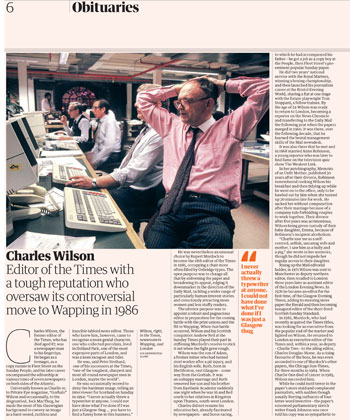
His death was covered by the Times (obviously), Telegraph, Sun, Independent, Glasgow Herald, Scotsman, Leicester Mercury, Manchester Evening News – among others. Well, why not? He edited a national institution. He was also the first man to sack Boris Johnson for lying. Even had he not run the Thunderer (and other papers), his later life activities with the Chelsea and Westminster Hospital and Countryside Alliance would have earned him a place in the obits pages.
It was unsurprising that Bill Turnbull, with his higher and more recent public profile, should be given greater prominence. But it was a huge omission for the Guardian not to report Wilson’s death in its print news pages – not even as a nib. It waited until Monday to run an obit that had been up online since the previous Friday.
What a shame. It was easily the best account (until the tributes and personal stories started to roll in), capturing the man in a way that neither the Times nor Press Gazette managed. They both read like cuttings jobs.
Oh, and that story about “Where the **** is Chad?” It was used at the time as evidence of his lack of understanding of international affairs and unsuitability for such an important editorship. But he knew exactly where Chad was. The point he was making was that many readers might not and so the subs should put in a map to help them. After that, it was a rare foreign story that didn’t come with a locator tucked in somewhere.
Legend.
Headline of the year (so far)
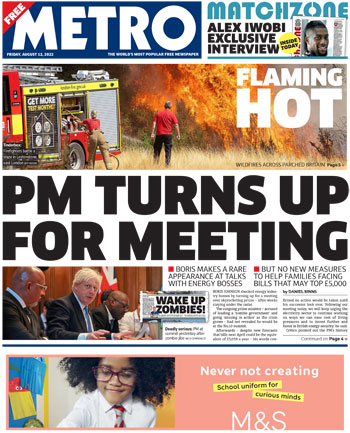
After all that tutting about papers putting comment where news should be, here’s a piece of work straight out of the Joe Lycett playbook. It demonstrates more clearly than any number of words I could write how you can make a point with a perfectly straight, factual heading without the need for underscores, caps or “Now…” for emphasis.
Genius.
Liz Gerard’s Notebook is a fortnightly column published in the InPubWeekly newsletter. To be added to the mailing list, enter your email address here.





